Oprah’s 2020 Vision Tour: Tracee Ellis Ross
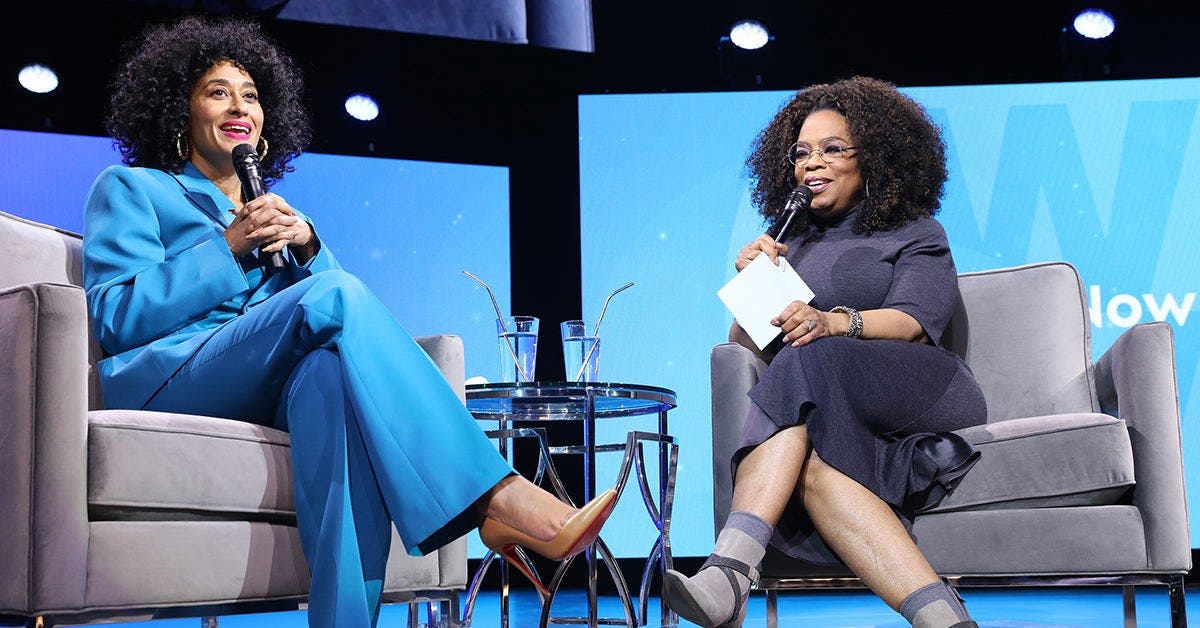
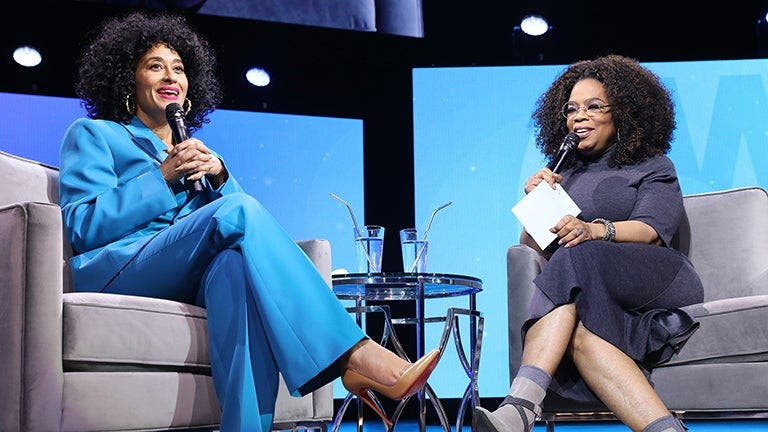
Watch Oprah interview Tracee Ellis Ross below:
Read the full transcript:
OPRAH: All right. Hey. Okay. So we've been loving our WW visionary conversations so far. And I'm so excited about today. As Dr. Rainbow Johnson on the game-changing, culture shifting delightful hit show Black-ish, Tracee Ellis Ross helped create a new conversation about all that it means to be empowered as a black woman in America today. She is a Golden Globe winner, a style icon, she's a global—global wellness influencer. Dallas, please welcome our WW 2020 visionary conversation, Tracee Ellis Ross.
(Applause.)
(Tracee Ellis Ross entrance.)
OPRAH: Yes. Yes. Yes.
TRACEE: Oh, my goodness. Let me hug you one more time. How's you guys?
OPRAH: Tracee Ellis Ross.
TRACEE: Oh, my goodness. Look at this. This isn't a room. This is beyond a room.
OPRAH: It's a—it's an arena. Thank you for flying all the way to Dallas.
TRACEE: Oh, I would fly to Dallas for you. I'd fly to the moon.
OPRAH: This is actually our very first one-on-one—our first time together one on one.
TRACEE: A gal has dreams.
OPRAH: Well, it has been so, really, meaningful and delightful to watch you from afar just flourish, just—you're flourishing. And flourishing into everything it means to be a woman who is completely full, as I've been talking earlier, full and filled with life for herself. You say you are living an abundant, you call it, “juicy,” life.
TRACEE: Yeah. A juicy and joyful life.
OPRAH: What does that look like to you?
TRACEE: Well, it's interesting. I feel like as I've gotten older, I've become more myself. And the more I am myself, the more my life looks like me. And it's not the same as anybody else's. And so it's been this process of first coming to know myself. Then accept myself. Then love myself. Not on every day. Be kind to myself, even when I don't feel like I want to be. And then ask myself all those questions of what I really—what I really want for my life.
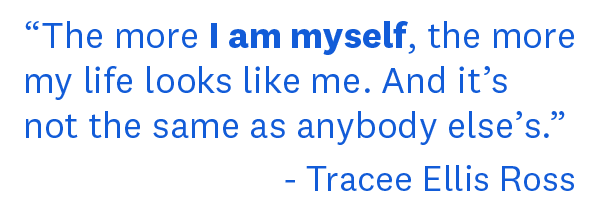 OPRAH: That's what I've been talking about.
OPRAH: That's what I've been talking about.
TRACEE: Yeah.
OPRAH: Yes.
TRACEE: And it's such an intimate journey that has taken time. Like even after I discovered the things I like, the things I want to do, my dreams, who I am, then the courage to actually walk towards those things is, in and of itself, its own journey.
OPRAH: So I've been watching you from afar. And I've seen you do lots of things. You were the first black woman to ever open the TED Talks. That was incredible. One of the—
TRACEE: One of the scarier things I've ever done.
OPRAH: That was fantastic. I liked that very much. I thought you were in your power. But the thing I loved so much that made my eyes water is that speech that you did for Glamour in 2017. And you said something in that speech that reminded me of a moment that Maya Angelou shared with me years ago. She said when she was in a really down time and that she was with someone who said, remember, God loves you. And she said, God loves me? And the realization of that, that God was here all the time.
TRACEE: And you don't realize.
OPRAH: Here all the time. But you don't realize. And you had one of those moments. Tell everybody what that was for you.
TRACEE: So, we walk around, I'm doing what I want to do. Living my life. I'm making my dreams happen. Putting one foot in front of the other. I'm making it all up. And then I had one of those moments which actually came—I was journaling. I had broken up with somebody. We'd been broken up with each other for quite some time, and somehow I was having a ton of anxiety about telling him—again, I'm going to repeat. We had been broken up for some time. I had anxiety about telling him I wanted to meet other people. What is that? What is that? And these are the moments that I say to myself, like, what is that? Like these—you kind of question, like, what is running me right now? Like what is this dialogue I'm having? Where did it come from? Is this some tape that's mine? Is this a cultural tape? Is this me thinking I have to ask permission from somebody to live my own life? And in my journaling, I wrote, "My life is mine." And it just—I mean, I say it and it takes my breath away because—and—because one doesn't realize, really, particularly as a woman, particularly as a black and brown woman in this culture, in the swirl of patriarchy and racism and sexism and all of these things, these things that are sort of giving us a—a map that is not necessarily our own, that we can actually make choices for ourselves that are not just externally for ourselves, but that actually match that very quiet voice inside our hearts. And it launched me into, honestly, the life I'm living right now.
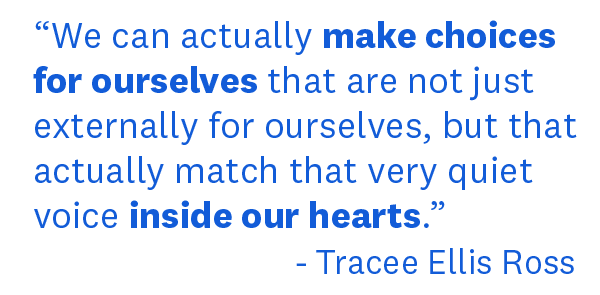 OPRAH: Really. So, did you all hear that? My life is mine. My life is mine.
OPRAH: Really. So, did you all hear that? My life is mine. My life is mine.
TRACEE: Can I just take a minute and, like, take a deep breath because the echo's crazy? But are you used to arena talking?
OPRAH: There's a lot of people in here. Seventeen thousand people is a lot of people. It's arena talking. We're arena talking.
TRACEE: There's this little intimate conversation.
OPRAH: Yes. But when that realization hit you that my life is mine, I would think that that would bring tears to your eyes and that would be the kind of thing that would be, like, whoa.
TRACEE: It brought a lot of tears to my eyes. It also begged a lot of questions. Where are the places where I'm not living my own life? And, you know, so many of the epiphany moments that occur are met with grief and tears and my own judgment. And even when you have a moment like that, even when I had this moment of naming those words and holding them and hearing them, I then also didn't just do it right away everywhere.
OPRAH: Right. Those moments—
TRACEE: It's interesting when I did that speech, I was terrified to do it. I felt like I needed another three days. I knew it was too long. Didn't have time to cut it down. And I kept saying to myself, ‘you are enough just as you are—even if you think it should be different, you get to show up just as this speech is and that works. This is fine.’ But I was also terrified because I felt like there were such important things going on in the world, and I felt like this was not an important thing to talk about.
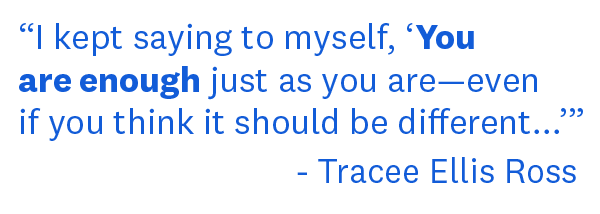 OPRAH: The fact that your life is yours and empowering other people to do the same.
OPRAH: The fact that your life is yours and empowering other people to do the same.
TRACEE: Yeah.
OPRAH: Which is really the only thing to talk about.
TRACEE: The most important thing to talk about.
OPRAH: The most important thing to talk about.
TRACEE: And it didn't even dawn on me then. Afterwards I had a lot of shame about revealing something so vulnerable. And then it took me two years to realize how revolutionary the thought is, particularly for a woman.
OPRAH: Yes. Yes.
TRACEE: That we—yeah. So you can applaud for that. That's for all of us. (Applause.) To actually live in your own life.
OPRAH: You know, in the '70s, speaking of living your own life and what oddly for other women is in the '70s, for me it was Mary Tyler Moore. Mary Richards was on TV. She was a single woman. She was a heroine, but she was a fictional character. And in 2020, I know you realize this, that a lot of single ladies point to you—
TRACEE: Oh.
OPRAH: —as an example of being what an unmarried woman could and should look like. (Applause.) And I imagine that's not a role that you'd ever thought you'd be playing.
TRACEE: Oh, but I, like many of us, was taught to grow up dreaming of my wedding. Not of my life. And I spent many years—
 OPRAH: Say it again.
OPRAH: Say it again.
TRACEE: —dreaming of my wedding.
OPRAH: Speaking to the choir.
TRACEE: And also waiting to be chosen. Well, here's the thing. I'm the chooser. (Applause.) And I can choose to get married if I want to. But in the meantime, I am choicefully single. Happily, gloriously single.
OPRAH: Amen.
TRACEE: And I do wish there were more examples. And one of the reasons I'm okay talking about it. And, by the way, my life is mine, my speech really was geared towards that. You know, at the time I was 45 years old and single and I had just pushed out my fifth kid on television.
OPRAH: (Laughter.) The irony of that.
TRACEE: And in that context, so many people asked the question, have you ever thought about having children? Like, I mean, my child gave my life meaning. I said, are you saying my life is not meaningful? And because of the structure that we live in, it is so easy for me to feel undermined, with all the accomplishments that I've had, and my accomplishments, I don't mean the whopper stuff. I mean I take the garbage out before it stinks. I eat food that's good for me. I get my sleep. I show up for my friends. And that makes a life very meaningful. And somehow, the rug gets pulled out so quickly when people put me in that, you should be married. Why aren't you married yet? Like what's wrong with you?
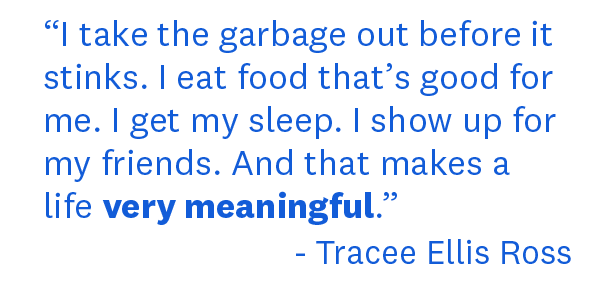 OPRAH: Well, you know, I got that until my 50s. So you've got a while to go.
OPRAH: Well, you know, I got that until my 50s. So you've got a while to go.
TRACEE: I only have three years. But people keep asking me. And I don't mind when people ask me because every time they ask me it's an opportunity for me to change the narrative and expand the story of who we are and what we can be as women.
OPRAH: I find it interesting. I thought what you just said is so important for people to realize . because there are some people in here right now planning wildest dreams and not giving enough thought to the actual marriage. And you said that you grew up being prepared, like we all were, to think about the wedding day. You already knew what you were gonna wear. Right?
TRACEE: Oh, my god. I was so specific. I'm gonna have to wear it to my 50th birthday. I wanted to wear a Victorian dress—we don't need to spend time on this.
OPRAH: I want to know.
TRACEE: It was a Victorian dress. I have the shoes, by the way. And I wanted to wear multiple, like, vintage '90s, like hang off my shoulder with a little bit of a corset and then a skirt and then I was gonna change into for the reception—
OPRAH: Reception.
TRACEE: —a cream suit with a wide leg trouser with a very large exaggerated cuff and a double-breasted jacket. And a satin lapel. And my man was going to be—
OPRAH: (Laughter.)
TRACEE: —a really good hugger. But, you know, the partner that I will meet, that list has also expanded. How he hugs is important. But that I feel safe. That he's trustworthy. That we're equal partners and that there's equity in our relationship.
OPRAH: Wow.
TRACEE: That we both get to negotiate our partnership. Not by the standards of what the culture says. But instead about what's important to us about connection and relationship.
OPRAH: I think that's amazing. And also because I was saying earlier a lot of people just want to be married. They want a man. But they don't have the specifics.
TRACEE: Be specific. My mom has always said that. Be specific. Make a five-year plan. Make a list. I mean, I need to knock it back a little bit with my list making. Can I just say, though, that I've been dying to have this conversation with you because there are so few women who hold the space of robust, abundant lives that are not in context to a man or someone else.
OPRAH: Yes. Thank you for that.
TRACEE: And I've always wanted to have the conversation because you are just a couple steps ahead of me. And—I just mean in the years she's been on the planet.
OPRAH: Thank you.
TRACEE: And I think that it's so important for me to continue to hear different versions of what a life can be.
OPRAH: Well, I didn't marry because I knew that I would not be able to have the life that I had dreamed if I married. I didn't marry because I—I've been partnered with Stedman since 1785. But—(laughter)—and he is a wonderful man. But he is also a traditional man who had his own ideas about what being a wife was.
 And the moment he—what I realized, and this is what you all need to know for yourself. I wanted to feel worthy enough to be asked. And the day he asked me, I started to feel like, oh, God, what does it really mean to be married? That's when I started to ask the questions about what that really meant. And, here, like you, I had all these dreams, like all girls grow up being taught, that we're supposed to—so I remember the first time I heard Roberta Flack sing, “First Time I Ever Saw Your Face.” You all know that song? I thought, that's gonna be my wedding song. That is gonna be my wedding song. And I had this dream, like you, not about what to wear, but that I was gonna come in a carriage. There was gonna be white horses. There were going to be people literally coming with bells on dancing on the lawn. And there were going to be trumpets. And so I gave that wedding to a friend.
And the moment he—what I realized, and this is what you all need to know for yourself. I wanted to feel worthy enough to be asked. And the day he asked me, I started to feel like, oh, God, what does it really mean to be married? That's when I started to ask the questions about what that really meant. And, here, like you, I had all these dreams, like all girls grow up being taught, that we're supposed to—so I remember the first time I heard Roberta Flack sing, “First Time I Ever Saw Your Face.” You all know that song? I thought, that's gonna be my wedding song. That is gonna be my wedding song. And I had this dream, like you, not about what to wear, but that I was gonna come in a carriage. There was gonna be white horses. There were going to be people literally coming with bells on dancing on the lawn. And there were going to be trumpets. And so I gave that wedding to a friend.
TRACEE: I love that.
OPRAH: Including Roberta Flack singing, the “First Time I Ever Saw Your Face.”
TRACEE: Unbelievable. You know what, as you were talking, do you know what I did?
OPRAH: What.
TRACEE: When I was nominated for the Emmy, the Emmy the first time, it had been 30-some odd years since a black woman had been nominated in that category.
OPRAH: Yes.
TRACEE: For acting in a comedy.
OPRAH: A comedy or musical.
TRACEE: But I wore a white dress that was a couture Ralph Lauren dress that was made on me and for me. And I realized during that process it was my moment to be married to my own life.
OPRAH: Whoa.
TRACEE: And to actually walk in what I had created and built. That this was a moment that was not just mine. It was all of ours. All of us who have been being the lead in our lives for eons, but somehow don't get the moment of recognition. And I was gonna marry my own self, my own experience, and live in every juicy moment of that, whether I won or not, knowing that I was holding what I wanted for all of us.
OPRAH: And then you won.
TRACEE: I didn't.
OPRAH: You didn't win?
TRACEE: Oh, my God. Golden Globe. Golden Globe.
OPRAH: Okay. Golden Globe.
TRACEE: Oh, God, can you imagine if I won that year? I wouldn't—(inaudible.) I won the Golden Globe. (Inaudible.)
OPRAH: So you said you had to learn to dismantle expectations of you. What does that mean?
TRACEE: Some of it has been my own personal expectations of myself. There's one of the things I say to myself like sometimes what I think of myself is none of my business. Not only what other people think of me but sometimes my own ideas of myself. Like, just enough. Thank you so much. Goodbye. You have five minutes now. You'll need to stop. Or you can do it, but in another room, please. But really it's been about unpacking these ideas that often I don't even know I've adopted. Ideas about who I think I should be. Like, I don't know, I used to think it was my job to be this quiet, demure, gentle woman who would listen and smile.
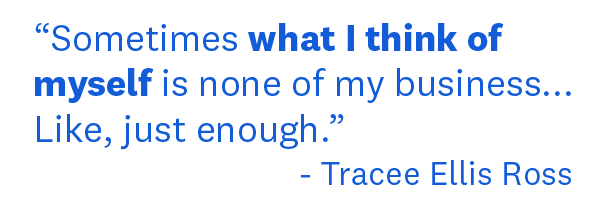 OPRAH: Where did you get that idea from?
OPRAH: Where did you get that idea from?
TRACEE: It's all over the movies, Oprah.
OPRAH: You're watching too much Little Women. Yes.
TRACEE: Well, I laugh like this. (Laughter.) My hair is big. When I smile, my mouth opens wide. I get loud sometimes. Sometimes I'm soft and sometimes I'm not and I get angry and there's all these different pieces of me. And I didn't know where they were supposed to fit. I was trying to become this thing that I thought others expected of me. And the truth is, that all those things that I tried to hide about myself, I taught myself how to smile so my top lip would go away.
OPRAH: And how is that?
TRACEE: (Indicating.)
OPRAH: (Laughter.)
TRACEE: Terrible. Terrible. All these ways that we sort of—
OPRAH: It takes a lot of practice to get that.
TRACEE: I do a lot of practice on everything. You better be practicing the right things.
OPRAH: Yeah. Yeah. Yes, yes, yes.
TRACEE: That you have it on the right stuff. Not to be teaching yourself to be smaller than you are.
OPRAH: I want to know how your idea—that's a good—that's worth applauding. (Applause.)
TRACEE: Did you say that's worth a party?
OPRAH: Applauding.
TRACEE: Yeah, it's worth a party. I'll take that.
OPRAH: I'll do that, too. How has your idea of beauty changed over the years?
TRACEE: Oh, it has really evolved. I remember watching the Nina Simone documentary [What Happened, Miss Simone?] and thinking to myself, my God, why is her name not next to the word beauty? I have never seen such a woman inhabiting her skin. I mean, I was—my whole body was sort of riveted from that. I was, like, this is—this is what I call beauty. When I see people who are just in their skin living at that height of themselves—
OPRAH: Right.
TRACEE: —I am blown away. So my—you know, there's an industry around beauty that is based on telling people, you need to look like that so that you can buy these things. And I just completely disagree. I feel like the industry of beauty should be based on meeting yourself. Because all of us—
OPRAH: Meeting yourself exactly where you are.
TRACEE: Where you are. Oh, I'm so glad you said that. It's my favorite—[meeting yourself exactly where you are] is the fastest way to where you want to go.
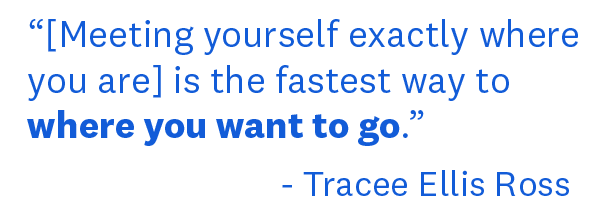 OPRAH: Yes.
OPRAH: Yes.
TRACEE: Right through where you are.
OPRAH: Yes, yes, yes.
TRACEE: And the moment—that takes me to something else. But I want to answer you about beauty but will you remind me to say something about ‘may I’?
OPRAH: Okay, good, may I.
TRACEE: Oh, it's time for the shoes to come off.
OPRAH: Take 'em off. Yes. Good, good, good.
TRACEE: So beauty, for me, has been about discovering myself and about owning what makes me feel good. Listening to what makes my heart sing. And actually meeting that person. And I find when I—like pretty is a whole different thing. Pretty is a thing, I don't know, you can get it in a can and sell it or something.
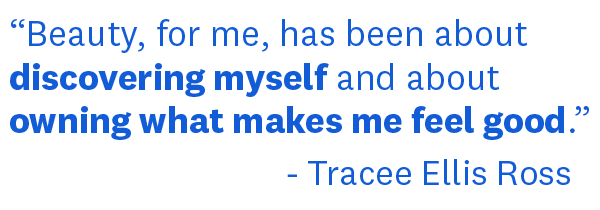 OPRAH: Give yourself an Instagram filter.
OPRAH: Give yourself an Instagram filter.
TRACEE: Yeah, but I don't want to traffic in that.
OPRAH: Yeah.
TRACEE: I want to traffic in that stuff again that feels juicy and abundant and that actually has the long-term run of, like, making you feel a certain way. And I often see myself and go, oh, wow, I feel so much prettier than I look. (Laughter.) But at the same time, who cares? There's so many things happening in life. Like who cares what I look like?
OPRAH: That is funny because that happens to me, too.
TRACEE: Oh, is that what I look like?
OPRAH: You see yourself and you go, oh, I thought I was looking better than that. Yes.
TRACEE: And by the way—
OPRAH: That has happened to me.
TRACEE: And mirrors lie, too, sometimes.
OPRAH: Yeah.
TRACEE: Because in the mirror you see your feelings. And I'm, like, yeah. And then you get on the red carpet or whatever and you get home and you're, like, oh.
OPRAH: (Laughter.)
TRACEE: Okay.
OPRAH: I read where you told Health Magazine that one of the good things that you do is you talk nice to your body. What does that sound like?
TRACEE: Well, that's another language happening.
OPRAH: Yes.
TRACEE: I don't know, I try really hard. Sometimes we're not gonna do that. Sometimes I'm squeezing myself everywhere. Just squeezing it. And getting older is fascinating.
OPRAH: Isn't it?
TRACEE: Yes. It really is. It's just different, isn't it?
OPRAH: It is. (Laughter.) And nobody talks about it because everybody wants to be stopped in their Botox tracks.
TRACEE: Oh, just stop it.
OPRAH: Yeah. Yeah.
TRACEE: You know what I say about Botox?
OPRAH: What.
TRACEE: No. Laugh. Wash your face. Change your underwear. Look at a tree. Come on.
OPRAH: Come on.
TRACEE: You know what I mean? Really, because if we spend so much time thinking about and talking about what we look like, how are we gonna do all the other things we need to be doing?
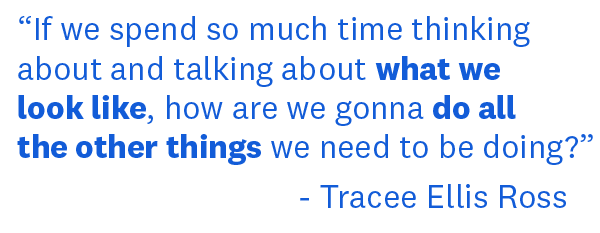 OPRAH: It's hard.
OPRAH: It's hard.
TRACEE: It's hard.
OPRAH: It's hard.
TRACEE: And I get it because you want to feel good. I personally, I work out a lot because I like to feel strong. In order to get through a 15-hour day, I've got to feel strong. You know, that's why I eat good food when I'm working because I've got to feel strong. Otherwise you wilt.
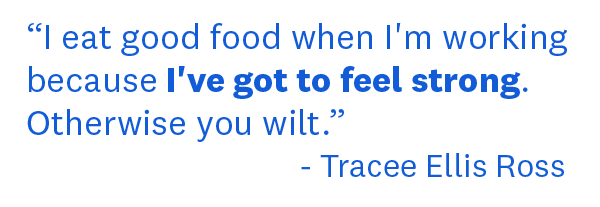 OPRAH: How do you refill your bucket? Because, listen, every time we see you out on a carpet or out in the world, you come with this vibrancy full of life. I know it cannot be that way all the time. So how do you rebuild, renew?
OPRAH: How do you refill your bucket? Because, listen, every time we see you out on a carpet or out in the world, you come with this vibrancy full of life. I know it cannot be that way all the time. So how do you rebuild, renew?
TRACEE: I have an arsenal of tools. But because of how busy and full my life is, time seems to be the thing. Right? There's just never enough of it. So I have learned that—and by the way, it's full with such good things.
OPRAH: Yeah.
TRACEE: It's, like, dreamy.
OPRAH: It's like a big adventure for you.
TRACEE: Which, by the way, itself can be scary. When the dreams happen sometimes it's, like, okay, can I really do this? But in that, I have found that doing my best and being present is my biggest gift. And staying present for me often means going as slow as the slowest parts of myself. Moving slowly from A to B. A really practical one, it's gonna sound crazy, but peeing when I have to pee. All of us do it. We forget. We hold it. It seems really intimate and weird. But, like, it's one of the ways that I know I'm, like, present with myself, holding space for myself, and, like, really taking care of myself. I try to eat really well. Sometimes I—my mind starts moving as fast as my day and as fast as all the things I need to be doing. So soup is really helpful.
OPRAH: I love soup.
TRACEE: Soup is a very meditative experience.
OPRAH: Because you can't eat it moving around.
TRACEE: No.
OPRAH: You have to sit down.
TRACEE: Sit and eat it. And I don't drink my soup. Get a spoon.
OPRAH: Get a spoon. That's what I do, too.
TRACEE: You've got to blow on it. Then you've got to put it in your mouth. Swallow it. But you can chew really fast and not really chew.
OPRAH: Yep.
TRACEE: But, like, soup, there's like a whole—and I define meditation is doing what I'm doing while I'm doing it. Which is so much—
OPRAH: Which is being fully present.
TRACEE: Being fully present.
OPRAH: Being fully present.
TRACEE: So eating soup is helpful. I love a bath. I often have to wake up for work at 4:30 in the morning. And sometimes I will take a bath at 4:30 in the morning because it just—it doesn't, like, shock me into my day. It just gently moves me into my day. I have a really good tribe of girlfriends and friends around me that are—
OPRAH: Just weren't on the show for nothing.
TRACEE: That mirror back to me the truth of who I am when I can't see it. That love me when I feel like I can't love myself. I'm really close to my siblings. Rhonda and Ross are here.
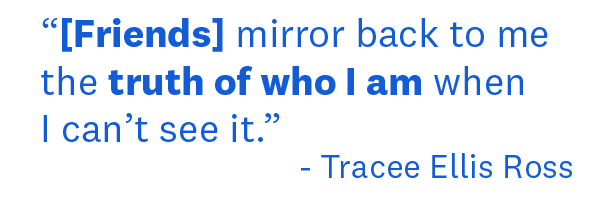 OPRAH: Rhonda and Ross, where are you guys?
OPRAH: Rhonda and Ross, where are you guys?
TRACEE: So I have Rhonda, my older sister, me, then Chudney, my younger sister, and then Ross and Evan. I talk to Rhonda a lot and Evan a lot. Chudney and Ross, we don't talk as much. They're not as talkative. But they are heart people.
OPRAH: Let me ask you this. You were just saying all the incredible things that are happening in your life. Was there a moment or a time where you weren't so sure that you would be able to step into your own shoes? Because I can imagine growing up with the legendary Diana Ross being—
TRACEE: Drink on that.
OPRAH: Drink on that—being your mom. That were there times you felt like you were in the shadow? Or did you always feel like you were in the light?
TRACEE: I always say, and I don't just say it. I mean it. I feel like I grew up in her embrace. Not in her shadow. In her love and in her care. My mom is extraordinary. And the Diana Ross people know, like, the mom doesn't—Diana Ross doesn't hold a candle to my mom.
OPRAH: Really.
TRACEE: I'll say that. No.
OPRAH: Wow.
TRACEE: She's top-line mommy.
OPRAH: Top line.
TRACEE: Top-line mommy.
OPRAH: May I just say this to you? I've said this to your mother. In all the years I've done interviews, I've only been nervous three times in my life. The first was with your mother. And the first—I'm gonna—the first was with your mother. Because when your mother was on the Ed Sullivan Show with Diana Ross—Diana Ross & The Supremes—the very first time, it was a legendary moment. And those of you who are old enough to have been colored people, and then Negroes, you know that that was back in the day when we would call people and say, colored people on, colored people on, right now. Colored people on Ed Sullivan. Colored people on. And you'd call everybody and by the time you called everybody, colored people on, they'd be off. But the first time I saw her on that show, I felt like that Nikki Giovanni poem where the girl went to Sunday School and heard about Shadrach, Meshach, and Abednego. She said she heard about all of them in the fire. And then she heard of Sheba, who was black and comely and she said, ‘I want to be like that.’ And the first time I saw your mother, that planted the seed inside me that something else was possible for my life. That's what your mother did for me. (Applause.) That is what she did for me. And I honestly—I honestly do not think I would be who I am, where I am, with all that—that I have learned and gained, had there not been Diana Ross. Had there not been Diana Ross. So I know she's bigger as a mommy. But for me and the rest of the world, what she meant to us.
TRACEE: And so to answer your question—first of all, thank you for sharing that. And I—I don't take that lightly. And I haven't in my life taken that lightly. And as a result, you know, interesting being a kid. Like will I be able to find my own space? And I always felt I could feel the energy coming at me. But I knew that the energy was coming at me because I was a piece of something, someone that other people loved.
OPRAH: Yeah.
TRACEE: And so I wanted to find my own thing so that I was deserving of any attention that came at me so that it didn't feel like I was a fraud in the light. And my journey—you know, and part of the reason my mom is such an extraordinary mom is because she really, all five of us are so different. And she's really given us the love, the breadth, the safety to find our own space and journey. And—
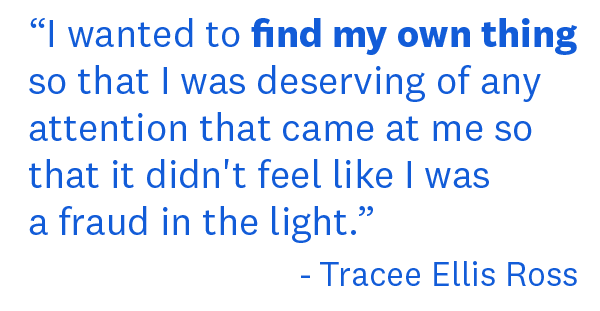 OPRAH: So she mothers you all differently.
OPRAH: So she mothers you all differently.
TRACEE: Yeah. But the same.
OPRAH: But the same.
TRACEE: You can tell we're all from the same mommy in terms of the way we walk through the world. The way we interact with people. I mean, I don't know if I can sit here and do all that. Let's see. I don't know. I don't know if I can articulate in a quick way. But finding my own space and my own self has not been in response to my mom. But there was a part of me that I hid off, even though it was my original dream. Which was to sing.
OPRAH: It was?
TRACEE: Yeah. So, I mean, I've done well as a comedy lady. You know what I mean? And then I started this journey of finding my own voice and realizing that I had a socially active voice and a political voice. And as a woman, just finding my ability to use my voice and to speak up for myself and others. But there was this little girl in me whose original dream was to be on a stage in a sparkly dress.
OPRAH: And so did you hide that because your mom—
TRACEE: I don't think it was on purpose.
OPRAH: Yeah.
TRACEE: I think it was very unconscious when I tucked her away. It felt dangerous. It felt like I was gonna be obliterated and compared. I remember early on there was an interview you did with Lisa Marie Presley. And I felt like, oh, that's a scary place to be in. The comparison. And I was—and somehow I just tucked her away. But it's been a dream of mine. And at 47, like this year two of my biggest fears and dreams have happened. And so I'll backtrack to about—what was 2007, Obama started campaigning.
OPRAH: Campaigning.
TRACEE: And right before that, because as I said, I meditate a lot and a journal and I do all these things. Right? So I was sitting under my tree in my backyard. I'm very big with trees. I find them to be some of the wisest of beings on this planet.
OPRAH: True.
TRACEE: They just—
OPRAH: True.
TRACEE: —they just—really, I learn so much from them. So I'm sitting under what I call my—it was my tree in my backyard and I was meditating, and this came out: (Singing.) "Pop, pop, pop, pop, pop, pop, pop. Pop, I found my voice. Pop, pop, pop, pop, pop, pop, pop. Pop, I found my voice." And I was, like, all right. I don't know what that means. I went upstairs and an hour later they called and asked me to campaign for Obama. And I started this journey of living a space louder than my own experience, using my voice for more than just myself. Then about eight, nine months ago, year ago, I guess it is now, a movie came along to sing.
OPRAH: And you said yes?
TRACEE: Yes. I said yes. Do you know how hard it is for me to talk about this? I'm sweating right now, first of all. And I feel so inarticulate.
OPRAH: No, no. And you said yes. Even though you were scared.
TRACEE: I said yes even though I was terrified. Even though I never sang publicly. Even though no one heard me sing. Even though every time—I'm going to cry—even though there was a time for me to sing with other people, I would make it funny. That way people wouldn't listen like you're Diana Ross's kid here. Right? So I hid myself. So it was as if I was walking around without all of me because there was a part of me that I wanted to shine, that I wanted to live, that wasn't. So it was like there was an arm tied behind me back. So I did this movie and I played a singing star and I had to record seven songs.
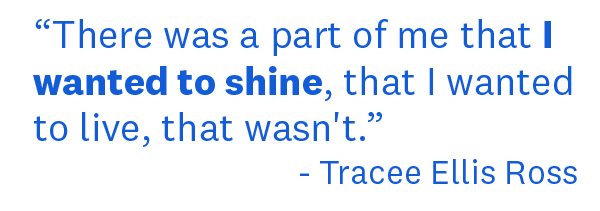 OPRAH: Whoa.
OPRAH: Whoa.
TRACEE: And it comes out in May.
OPRAH: This May.
TRACEE: This May.
OPRAH: And it's called?
TRACEE: It's called The High Note.
OPRAH: Oh, my.
TRACEE: And it was—there was—during the process, I don't seem to get scared in the process. I get scared after.
OPRAH: But people are gonna hear it.
TRACEE: Just in general. Like I do scary things and I'm, like, just go. Go. Go. And I get to the other side, what did I just do? That was terrifying.
OPRAH: Okay.
TRACEE: So there were moments during the movie when during the movie I wasn't frightened. But what I was doing was stepping into all of me. I was taking my scared—my most terrified— little girl and bringing her forward and saying, sweetheart, you can do this.
OPRAH: We're going to see a glimpse of her singing. Okay? Here we go.
TRACEE: No one's seen this. The movie comes out in May.
(Video played.)
OPRAH: Oh. (Applause.)
TRACEE: They like it. Oh, my God.
OPRAH: Oh. Whoo, whoo, whoo. Thanks for sharing that with us. Now, what happened when you—when you told your mother?
TRACEE: So it was—okay, now I will cry. This was one of the most beautiful moments of my life, I think. So I don't know if you guys know this, but listening to music in your car is the best place to listen to your music. So I was, like, mom, I'm ready. She's, like, you're ready for what? I'm, like, I'm ready for you to hear it. Okay. I said I'm gonna pick you up. So I picked her up and we sat in her driveway in my car. She came out of the house, came out of the garage, got in my car, closed the windows, and I was, like, okay. Here it is, mom. Here's me. And you can imagine, you know, we all have fears. We all have these things that we've hidden away that we think are not worthy of coming forward. They might not be good enough. They might be compared to somebody else. And I had to realize that it's not the sound of my voice. It's the honesty of my voice that is the key. I'm not supposed to sound like my mom. I'm never supposed—I'm not even supposed to be her. I can't fill her shoes. No one can fill her shoes. All I can do is make it—a pact with myself to be myself on the ground that I get. And even make more ground for me.
OPRAH: Yes. Yes. Yes.
TRACEE: Get away. Please. And so I got her in the car and the first note happened and she, like—she was—she was on this side. She pushed my arm and she turns to me and her face was covered in tears. And she said, "Finally."
OPRAH: That's a good life moment. That's a good life moment.
TRACEE: Yeah.
OPRAH: Ah. That leaves me speechless. That's really a good life moment. I can just see that. That's incredible. You told me to remind you about ‘may I.’
TRACEE: May I. What were we talking about at the time? But it made sense then. (Laughter.) Well, I can do it now. So a lot of people use the affirmation ‘I am.’
OPRAH: Yes.
TRACEE: And they—they worked for me for a minute. But they're also the fastest way to where you want to go. So the fastest place to where I want to go is through where I am. And I discovered that the space between where I am and where I want to be is often the thing that frightens me the most. So—
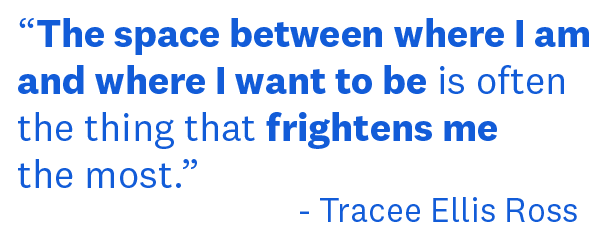 OPRAH: Say that again.
OPRAH: Say that again.
TRACEE: Where I am and where I want to be.
OPRAH: That space in the middle—
TRACEE: Is actually that scary space, you know. Like I want to sing. How in God's name do I get there? How do I face this fear? So what I discovered is if I break it down into bite-sized pieces and give it a ‘may I,’ as opposed to an, ‘I am,’ the ‘may I’ offers a gentle invitation, while honoring where I am and gently inviting me to where I want to go. So, ‘may I know that I am a singer’ allows me to not feel like a singer. ‘May I know that I'm worthy of love without effort’ allows me to gently move my way there. And for me, for example, fun is a tough one because I always feel like there's something I should be doing. So, ‘may I know that I can experience fun.’ And then it allows me to break those pieces down even smaller. Like, ‘may I do things that feel light-hearted?’ ‘May I do things that make me smile as opposed to this big, scary thing that's over here?’
OPRAH: Yes. And I like that because it's gentler.
TRACEE: Yeah.
OPRAH: Because, you know, oftentimes you're doing an affirmation. I am beautiful.
TRACEE: Yeah, and then you're, like, I don't feel beautiful.
OPRAH: And you're looking back at yourself going.
TRACEE: Yeah.
OPRAH: You can play that all day long.
TRACEE: Yeah. Yeah.
OPRAH: Yeah.
TRACEE: And our words are so important.
OPRAH: Yeah.
TRACEE: The way we use them. And one of my biggest, most regular prayers is, ‘Gentle.’ Gentle. And I've got to say it twice. Because just once, sometimes I don't hear it. Gentle, gentle, Tracee. Give yourself 1,000 breaks. And then give yourself 1,000 more.
 OPRAH: And have you reached that point I was speaking of earlier and that Lady Gaga shared with us in Fort Lauderdale of radical acceptance?
OPRAH: And have you reached that point I was speaking of earlier and that Lady Gaga shared with us in Fort Lauderdale of radical acceptance?
TRACEE: Mm, gentle acceptance. Real acceptance. Honest acceptance, yes. I feel like for me the journey is mostly about wholeness and making space for all of the—all of the many feelings.
OPRAH: I think that's so important too, Tracee, because so many people are striving for—particularly women—perfection, perfection, perfection. Getting this right.
TRACEE: It's so much trouble.
OPRAH: When really the goal is to be whole.
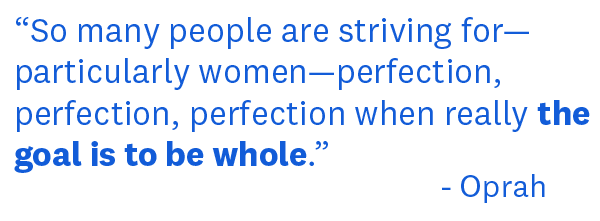 TRACEE: Yeah. And, you know, it's how I met loneliness. Loneliness was this big scary monster for me for so long. For so long, this thing that I was always running from. Like, I'll be lonely if I don't do anything for my birthday, or if no one does anything for my birthday. Or this thing, I'm single. I'll be alone for the rest of my life. Who's gonna take care of me? But I've answered all those questions. And I've realized, like, the wholeness makes space for all of it. I can feel scared that I'm gonna be lonely. And I can also ask myself, but don't you like being alone?
TRACEE: Yeah. And, you know, it's how I met loneliness. Loneliness was this big scary monster for me for so long. For so long, this thing that I was always running from. Like, I'll be lonely if I don't do anything for my birthday, or if no one does anything for my birthday. Or this thing, I'm single. I'll be alone for the rest of my life. Who's gonna take care of me? But I've answered all those questions. And I've realized, like, the wholeness makes space for all of it. I can feel scared that I'm gonna be lonely. And I can also ask myself, but don't you like being alone?
OPRAH: Don't you like being with the trees? Don't you?
TRACEE: I love it. Please. Choiceful solitude. I talk for a living. It's wonderful to be quiet. I love it. It feels really good. So all these ways wholeness kind of gives me the biggest of containers to hold the truth of my experience as opposed to this idea of what I ought to be living. And that feels so much better. Even wellness sometimes. Even people saying, well, you're looking for a balanced life. I'm, like, well, sometimes it's not very balanced. Like how do I be with myself when it doesn't feel balanced? How do I love myself even when I feel like I'm unlovable? What are those steps that I take? What are the, like, daily actions that I can take? And I feel like that is one of the benefits and beauty of being single. I have time to ponder these things and be choiceful of who I spend my time with and how I spend my time. Because there's no given. There's no, like, I've got to do this. When my dog passed away, I haven't been ready to find a new partner, that little love of my life. But I don't have to wake up and walk her. So it's me. I get to be choiceful about the day I'm living and how I'm doing all that.
OPRAH: Well, I had a 20-year dream to create a company that's fully represented our individual beauty. And let me tell you, I got the Pattern in my dressing room and I was using it. Yes. Absolutely. Tell us about that dream.
TRACEE: So—
OPRAH: That comes out of acceptance, too, does it not?
TRACEE: Yes, it does. The truth is, I tell this story through all aspects, the same story through all aspects of my life. Joyful, self-acceptance, and allowing us to take up our own space and live in that. But so Pattern is a hair company for curly, coily and tight-textured hair. A space of a mass of people, a community of individuals that I am a part of that have mirrored back loving
myself, me, that are not serviced by the beauty industry. Ten years ago, when I finished on Girlfriends, I wrote a hair care brand pitch and it's taken me 10 years to get it off the ground. Some of it is the fact that the world has now awakened to our power and our beauty and our glory and the gravity-defying awesomeness of our hair.
OPRAH: (Laughter.)
TRACEE: But Pattern has two, slash, three missions. One is to create effective products that work and are not toxic. That are good for your hair and actually make it juicy and joyful.
OPRAH: Juicy's the word.
TRACEE: Juicy's the word. And the other is to change the spare time how we as curly, coily, and textured people, because I don't believe hair has a gender, are marketed to so we can actually love the way our hair authentically comes out of our heads and see another space and other imagery that actually matches us with our beauty and our glory and all of that. So it has happened. And it is so exciting. And I love being a CEO and founder. I love using my brain in this way. It's similar to directing and producing. Like it's so much fun.
OPRAH: I was gonna ask you, when you're directing, because you directed how many episodes now?
TRACEE: Two episodes of Black-ish. One of Girlfriends.
OPRAH: Okay. So when you're directing, is it harder to direct other people who you're usually working with? Or harder to direct yourself in that?
TRACEE: I think it's harder to direct myself. Mostly because I'm such a difficult actress. No. No, it's a different part of my brain. As an actress, I act from my heart and my gut. And as a director, it's my mind and my eyes. So the switch, the gear switch is really difficult. So I prefer if I'm not in it.
OPRAH: You do?
TRACEE: Yeah. Yeah. So I like being in charge.
OPRAH: I was gonna say, do you like being the boss?
TRACEE: Very much so.
OPRAH: (Laughter.)
TRACEE: Yes. I think I was raised to be one. A boss lady.
OPRAH: I would say you have filled your own shoes beyond. And when you step back and you look at your life from the long angles, what stands out as the thing you're most proud of in continuing to become more of yourself?
TRACEE: I think embodying my real middle name, which is Tracee Joy?
OPRAH: Ah. We did that at the same time. Ah. Yes.
TRACEE: Because I feel like joy is revolutionary. It holds a different space than happiness. And I don't know that happiness is really the goal, but a sense of wholeness and joy, and I feel like we need a lot of that right now, and it allows us space to be present in our lives. I don't know. I think I'm in a space where it's time for me to dream new dreams, which is a really fertile and fun place for me. But I really like this idea of being joyful in my own humanity so that there's another example of what it looks like to allow ourselves to be the humans we are.
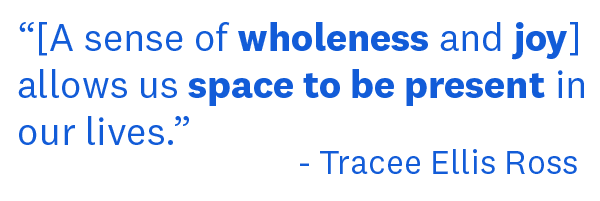 OPRAH: Thank you, Tracee Joy Ellis Ross for joining us in the arena of 17,000 people in Dallas, Texas. Thank you. (Applause.) Love to your mom. Got it.
OPRAH: Thank you, Tracee Joy Ellis Ross for joining us in the arena of 17,000 people in Dallas, Texas. Thank you. (Applause.) Love to your mom. Got it.
Follow @WW.Now on Instagram and Facebook for more from Oprah’s 2020 Vision Tour!
Find out more about the special guests on Oprah’s 2020 Vision Tour!
